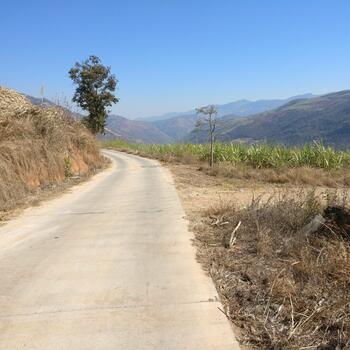I rode from Amsterdam to Kunming by bicycle, and every year during Spring Festival I grab the chance to indulge my bike travel addiction. For one full week it's just me, my bicycle and my tent. Last year I cycled from Honghe to Kunming, waving at beautifully dressed Hani minority couples who were traveling on motorbikes piled high with fireworks. This year, I ventured towards the Myanmar border, a corner of Yunnan I hadn't yet cycled.
I book a flight into Tengchong (腾冲) and out of Lincang (临沧). Only after I have booked the flights do I look at the route and the climbing profile. Luckily I like climbing and I'm in for a treat, as it looks like I will be going up and down between 400 and 2,100 meters every day. As I didn't train much, I plan for modest 60-kilometer days, or 500 kilometers over the course of a week.
I arrive at my hotel close to midnight, where my bike and luggage are waiting for me because I have sent them a few days previously by post. In the morning I wake up to the peaceful sight of a misty tea plantation fanning out around the hotel. The Gaoligongshan Tea Estate is hotel, plantation and restaurant all rolled into one, and is conveniently located just two kilometers walking distance from Tengchong 'Hump' Airport.
In the morning I do a bit of sightseeing. Tengchong is famous for its volcanoes and the hot springs that result from all the underground seismic activity. The Rehai Geothermal Scenic Area is where you can see clusters of hot springs in a river gorge. It is quite spectacular, with big clouds of sulfurous steam rising up from waterfalls and wells.

After that the real work starts. The roads are excellent and only going up. I climb to the town of Longling (龙陵), but opt to set up my stealth camp just before I reach the summit and the town beyond. At night I hear lots of animals rustling through the trees around me and I watch the stars through the mosquito netting of my tent. Kunming is very far away.
The next day I cross into Dehong Dai and Jingpo Autonomous Prefecture. The change in landscape, culture and climate is immediate, and I descend from the summit into the warmth of the tropics. Suddenly, there are Dai minority-style homes, peacocks and sour-spicy food. My stopping point, Mangshi (芒市), suffers a bit from urban decay, but is a very pleasant town otherwise.
As I have already covered a bit more than my daily distance and I'm quite exhausted, I decide to take a rest day and book two nights in a local hotel. I enjoy an afternoon of walking around, seeing a cute little pagoda that has been swallowed up by a banyan tree and visiting the botanical gardens.

This latter place is an interesting mix of garden, museum, religious site and showroom where exotic wood and strangely shaped stones can not only be admired but also bought. Fireworks are going off all over town, but apart from that it is quiet as everyone is at home, celebrating the arrival of the Year of the Pig at home with family.
Well rested and in good spirits, I set off again. The whole day I enjoy quiet roads in gorgeously dry and sunny weather. I come across a large gathering of Jingpo people at the first summit after leaving Mangshi. It's all downhill from there, towards the stunningly-blue Nujiang River.
I take a moment to just sit by the river and admire the turquoise waters cutting through the steep valley. This day I do almost 100 kilometers and end up exhausted but happy in the small town of Mengnuozhen (勐糯镇). There, a cheerful hotel owner keeps feeding me fruit until I fall asleep at 8pm. It doesn't get much better than this.
The next day I make the decision to do a longer route but with a little bit less climbing. Instead of taking a shortcut across a mountain pass as planned, I follow a loop of the Nujiang around a mountain. The Nujiang and tributary rivers zigzag and cut deep into valleys, which makes for gorgeous scenery but also very hard work, as the roads along the river snake up and down the mountains at every possible bend.

There is no traffic, just the sound of birds. There are just enough villages scattered about to get a bowl of noodles when I get hungry. But I make sure to carry enough snacks and water for the day. At one abandoned shed I see a large and pretty large and wild-looking cat disappearing from sight. I wonder about the wildlife around me.
A few hours later I run into a large group of Jingpo people who are on their way to the sugar cane patches, wearing traditional clothes with conical hats and machetes. This day too I do more than 100 kilometers until I crash for the night in a pretty dingy and smoky truck stop hotel in a town called Yongkang (永康).
Two more days of cycling and I find myself in Lincang a day early. I'm tired, sweaty and very happy. Upon arrival, I sleep for almost a full day. I loved the feeling of remoteness, the empty roads, the coulisse landscape with breathtaking vistas opening up after every bend in a river, the noticeable changes in culture and climate every time I crossed a summit into another valley, the perfect dry and sunny Yunnan winter weather. I would like to explore more around Tengchong, or just come back for a holiday — one where I just soak in the hot springs.














































Comments
Nice article.
Question for bike campers: I've always wondered how you are supposed to obtain water on an overnight bike tour. Do you carry it from town or the last hostel? I'd be leery about using water from natural streams due to livestock, pollution, etc.
thanks Vera for sharing your cycling journey, beautiful text, makes me want to ride and explore more parts of yunnan.
Hi @kc430 I always have a few reusable bottles with me that fit in the bottle holders on my frame or I stick them under the bungee traps at the back. I try not to buy bottled water for the plastic waste but fill up whenever I can at restaurants etc. Next to that I have a UV water purifier so I can drink water from streams if need be, but this is hardly an issue in China since there are villages and towns everywhere where you can fill up.
Prachtig Vera, je fietsavontuur weer heel mooi beschreven.
I cycled bits and pieces of this route back in the day. This area boasts some stunning scenery, and gets almost no tourism. Really glad to see it get some press here.
@veravdn. I have just noticed what kind of bike that is. Very nice.
Login to comment